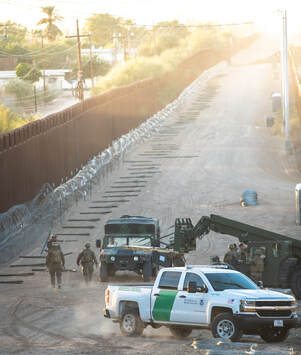
Its impossible to ignore. U.S. House members with Latinx ancestry visit short-term facilities, and find long-term holding, where women are dehumanized and in dog kennel like conditions. Here U.S. agents are conducting psychological warfare, on the one hand, and denigrating Latinx people, including Rep. Ocasio-Cortez, on social media. On the front page of the New York Times, Oscar Ramirez and his daughter Valeria lay dead for all to see. U.S. officials have chosen not to process refugee claims. People suffer, and we in the U.S. fortify our wall (see image). We have failed politically, socially, and morally.
It is increasingly understood that a major driver of the current increase in refugees from Central America is an unprecedented drought. As John Sutter and Adam Wernick report: "Many people who live in the dry corridor of Central America are subsistence farmers, completely reliant on what they grow for their survival. Unlike in the US and parts of Europe, there is no crop insurance or other programs to tide farmers over in bad years. Often, there are no irrigation systems, either. So, if the rains don’t fall, crops simply don’t grow." The UN Food and Agriculture Organization points out that 2 million people are in danger of hunger due to the drought. In El Salvador, 90% of the surface water is contaminated. The truth is, violence is driving people out of their homes. Poverty is driving people out of their homes. But, if its not an initiator, climate change is a major multiplier to the current border crisis.
In response to the human suffering around the globe, caused by climate change, The U.S. President has released a number of potent executive orders. Here is a list I found from 2017 alone.
2017: Border Security and Immigration Enforcement Improvements.
- Directs DHS to obtain control of are to extend the border wall, this adds 5,000 Border Patrol agents
- Increase the number of detention facilities, which limits access to due process
- Limits access to assylum
- Eliminates "sanctuary cities" and requires local police cooperation
- Expands priority list for deportations
- Adds 10,000 additional ICE agents
- Suspends visas from certain countries
- Suspends US refugee program, and bans Syrian refugees
In comparison, in Laudato Si' Pope Francis, the head of the Catholic Church, wrote: “There has been a tragic rise in the number of migrants seeking to flee from the growing poverty caused by environmental degradation. They are not recognized by international conventions as refugees; they bear the loss of the lives they have left behind, without enjoying any legal protection whatsoever. Sadly, there is widespread indifference to such suffering… Our lack of response to these tragedies involving our brothers and sisters points to the loss of that sense of responsibility for our fellow men and women upon which all civil society is founded.” The pope urges Catholics to overcome indifference, and to rather embody solidarity and encounter.
As a teacher with two decades of experience, I eye America's vitriolic discourse, and I feel we have failed far too many of our students. The government officials dehumanizing immigrants at the border were once our students. The protesters, shouting xenophobic hate at Latinx House members in front of of the detention center were also our students. Even Donald Trump was once under our in loco parentis care. We certainly have to teach for eco-literacy, so we don't continue to blindly destroy the lives of poor people around the world. And, when the results of our ecological yahooism emerge, we need solidarity and encounter. What might it mean to teach for these? In 2005, Carrie Kilman recommended a number of teaching practices, including: overcoming bias, listening deeply, ask questions, and create safe spaces. These seem like a good place to start.
DJS
 RSS Feed
RSS Feed
